Mark Curtis on the Labour government’s increase in military spending and its extraordinary new agreement with Ukraine.
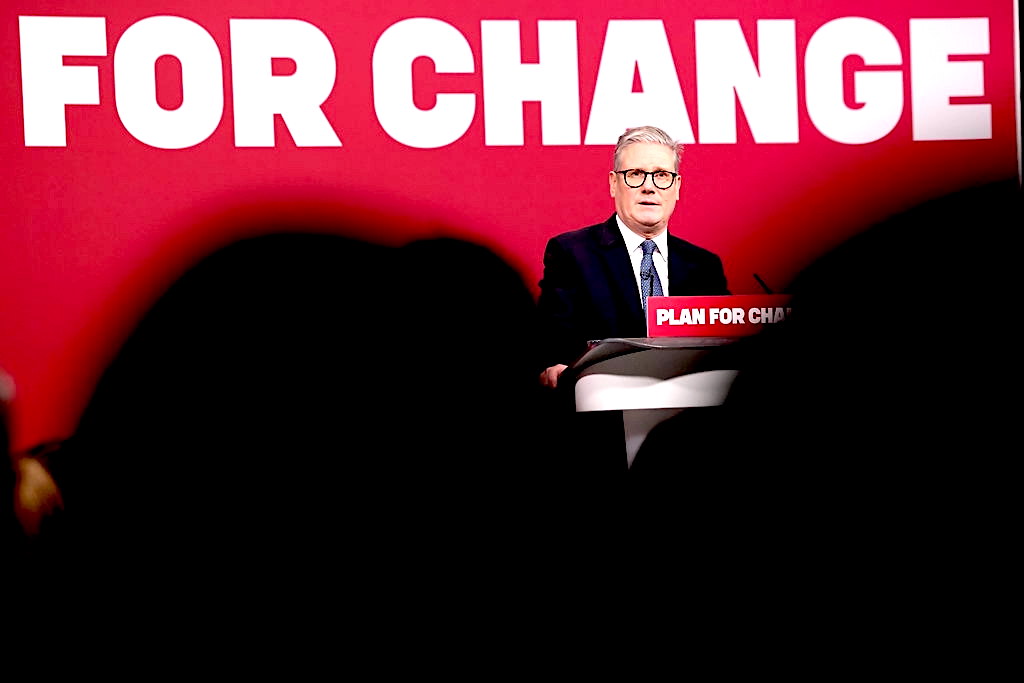
U.K. Prime Minister Keir Starmer giving his Plan for Change Speech in May 2024. (Kirsty O’Connor / No 10 Downing Street / Flickr, CC BY-NC-ND 2.0)
- U.K. military spending and aid to Ukraine are effectively providing a public subsidy to British arms firms.
- One major Defence Ministry contractor is currently being investigated by the Serious Fraud Office for suspected bribery and corruption.
 Wars can be useful to governments, and the horrendous conflict in Ukraine is so proving.
Wars can be useful to governments, and the horrendous conflict in Ukraine is so proving.
In his announcement of increases in U.K. military spending, Prime Minister Keir Starmer strongly referenced Ukraine and the threat from Russia and said the new “investment” will “create a secure and stable environment in which businesses can thrive, supporting the Government’s number one mission to deliver economic growth.”
He added: “The increased spending will sustain our globally competitive industry, supporting highly skilled jobs and apprenticeships across the whole of the U.K.”
Starmer sees the increase in funds to the military as part of Labour’s Plan for Change, its overarching economic growth strategy for Britain.
A few weeks ago, Foreign Secretary David Lammy echoed his prime minister in comments to an audience of arms firms about the extraordinary 100-year partnership between the U.K. and Ukraine. He said the new accord, which was signed in January, is “a platform for the U.K. defence industry” to extend military equipment to Ukraine.
Lammy added: “The U.K.’s defence industry is key to our growth and security by creating jobs, driving forward innovation and collaborating internationally.”
Britain’s supply of billions worth of military equipment to Ukraine is openly seen by the government as both boosting the fortunes of U.K. arms firms and promoting Labour’s whole economic growth strategy.
Giant U.K. arms firms like BAE Systems, Babcock and Thales U.K. will all likely benefit from increased military spending. They are already benefiting from new procurement contracts from the Ministry of Defence (MoD) as the U.K. gifts its current stocks of military equipment to Ukraine.
Much of U.K. military aid to Ukraine — which amounts to £4.5 billion this year — is really a subsidy to these arms firms.
Militarisation
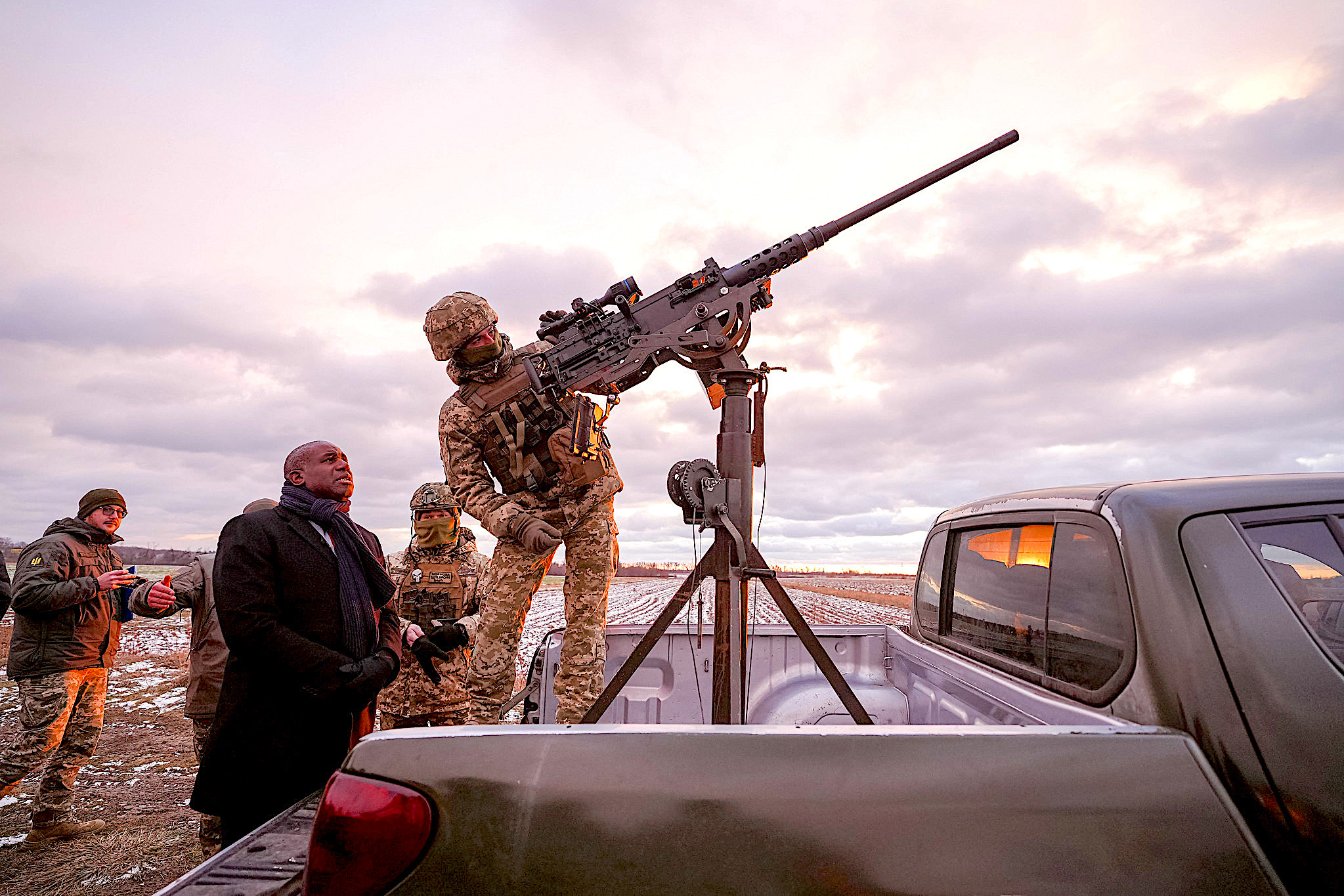
Lammy viewing an air defence truck and kit used by mobile support teams on Feb. 5, 2025, during his trip to Kiev. (Ben Dance / Flickr/ FCDO/CC BY 2.0)
The government has made no secret of the fact that it wants to “make the defence sector an engine for U.K. growth.”
Defence Minister Luke Pollard says that supplying Ukraine with weapons helps with “bolstering our own defence industrial base — creating jobs and driving investment.”
“By deepening our ties with Ukraine’s defence industry, we are expanding [our] own industrial capacity,” observes Major General Anna-Lee Reilly, who coordinates the MoD’s military support to Ukraine. She adds that U.K.-Ukraine military collaboration is about “opening up opportunities for the U.K. defence industry.”
The government can be given full marks for transparency. Its new Defence Industrial Strategy, announced last December, openly seeks to increase U.K. arms exports and arms industry jobs “in every nation and region of the U.K.” whilst prioritising British arms firms for government investment.
Ukraine is central to this thinking. The government’s policy paper on the new strategy states:
“Ukraine remains front of mind as this Government develops our new approach to its Defence Industrial Strategy: at this critical moment in the war, we must step up our efforts to supply military support and stand with Ukraine for as long as it takes.”
Ukraine already uses 17 different types of weapons and equipment made by BAE Systems, the U.K.’s largest arms company, such as Challenger tanks, armoured vehicles and ammunition.
Not only the war but the peace, when it eventually comes, will also be profitable. This year, Ukraine plans to spend a record $35 billion on arms production, with the U.K. financing the production of equipment such as air defence systems and long-range weapons in Ukraine.
Military Aid

Muzzle-view of the Challenger 2 main battle tank. (Ross Fernie /Defence Imagery, Wikimedia Commons, OGL v1.0)
The U.K. has already provided nearly £8 billion in military support to Ukraine since Russia’s invasion in 2022, with around 400 different capabilities sent to the country. This includes thousands of missiles and drones, over 10m rounds of ammunition, 14 tanks, as well as artillery guns, combat vehicles and naval vessels.
The £3 billion a year the government has pledged in military aid to Ukraine is additional to the MoD’s main budget and comes from the Treasury Reserve.
Equipment from the U.K. is either donated from existing U.K. defence stocks, purchased from British arms firms or else purchased from the surplus stocks of foreign governments.
This acquisition is either funded directly or coordinated through mechanisms such as the International Fund for Ukraine, of which the U.K. is also the administrator.
In addition, the U.K. is providing a £2.26 billion loan to Ukraine to enable it to “invest in key equipment, including British equipment,” the government says.
It’s no surprise that Ukraine has become a new, major market for British arms exports. In the 10 years up to Russia’s invasion in 2022, U.K. firms sold only around £35 million of military equipment. In the three years since the invasion, 2022-24, exports skyrocketed to £1.1 billion.
Replenishing Stocks
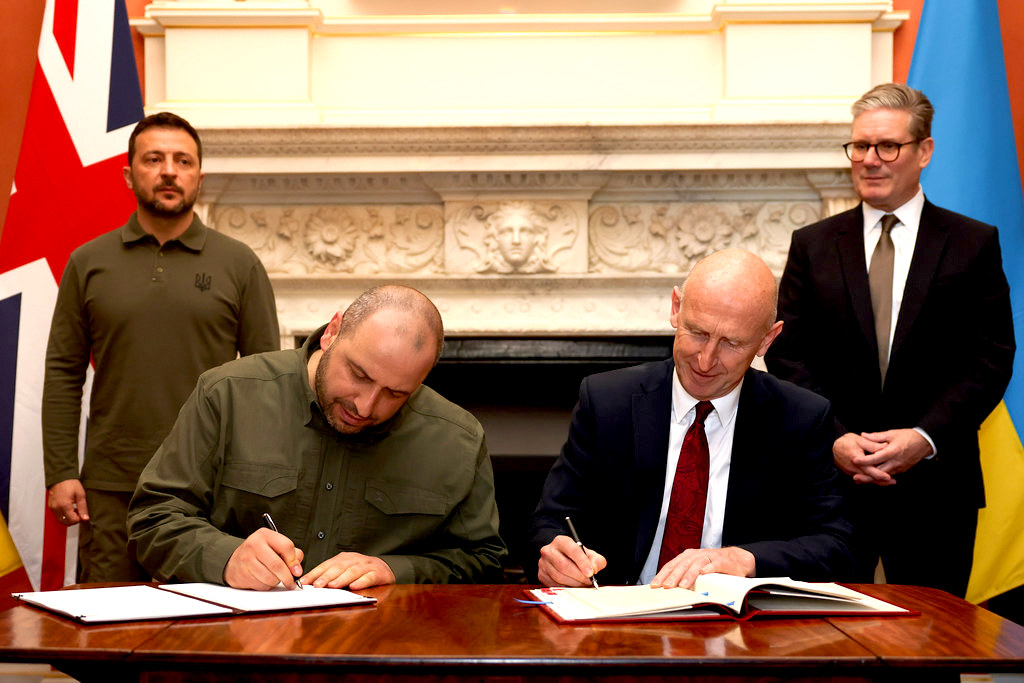
Zelensky, left, and Starmer, right, watching Ukraine Defence Minister Rustem Umerov and U.K. Defence Secretary John Healey sign the Defence Export Support Treaty in London in July 2024 (10 Downing Street/Flickr/ Lauren Hurley/CC BY-NC-ND 2.0)
One way the procurement system for Ukraine benefits arms companies is when the MoD replenishes British military stocks after gifting the same equipment to Ukraine.
In fact, the National Audit Office (NAO) estimates that the MoD will spend £2.7 billion on replacing equipment donated to Ukraine from U.K. stockpiles in the first two years of the war alone. The NAO further says that the MoD spent £2.4 billion on procuring equipment for Ukraine in 715 contracts, over the same period.
So desperate has the MoD been to get equipment to Ukraine rapidly that it has often given awards to arms firms through “non-competitive procurements with reduced oversight requirements,” the NAO says.
The U.K. has gifted hundreds of “lightweight multirole missiles” (LMMs) to Ukraine, which can be used against drones, helicopters or naval vessels. To replenish the U.K.’s own stocks, various contracts have been awarded to arms firm, Thales UK, which assembles the missiles at its factory in Belfast.
In July 2024, when the MoD announced an order for LMMs worth £176 million, Defence Procurement Minister Maria Eagle said “this contract is … a great example of how defence investment can support economic growth and sustain jobs in the U.K. for years to come.”
Last September Defence Secretary John Healey announced a further award benefitting Thales — a contract worth £162 million to supply Ukraine with 650 LMMs. The MoD said categorically: “This contract with Thales in the U.K. will further prime the world leading British defence industry to increase production rates, enabling future production to be ramped up.”
Thales has also received new orders from the MoD to supply Starstreak high velocity missiles and anti-tank weapons after that equipment has been gifted to Ukraine.
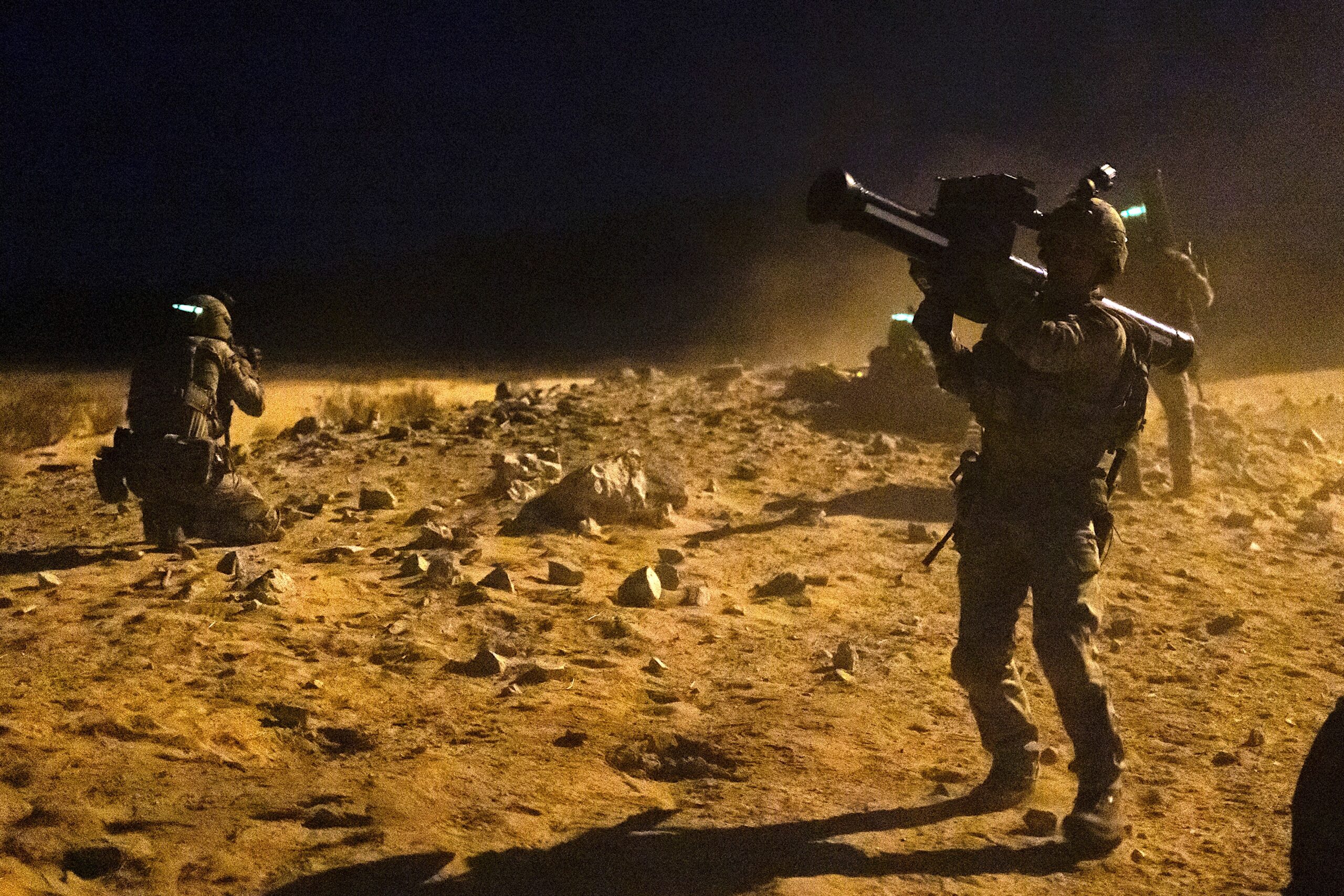
A Royal Marine, on right, carrying the Starstreak MANPAD Anti Air Missile during training at the U.S. Marine training center in Twentynine Palms, California, 2021. (Ministry of Defence/Flickr/Wikimedia Commons/OGL v1.0)
These contracts are especially noteworthy in that Thales is currently being investigated by the Serious Fraud Office for suspected bribery and corruption. The probe is reportedly over suspicions of corruption linked to arms sales abroad. Thales denies the allegations.
After the MoD gifts military equipment to Ukraine, it often awards repair and maintenance contracts to U.K. firms for the same weapons.
Earlier this month arms firm Babcock — another prominent MoD contractor —was awarded a multi-million pound contract to train Ukrainian personnel to maintain and repair military equipment including Challenger 2 tanks donated by Britain.
The supply of drones is another benefit to U.K. industry, highlighted by Britain being the largest provider of military drones to Ukraine.
When Rishi Sunak’s Conservative government announced a £200 million package of military support to Ukraine in February 2024 it stated that “the majority of this £200 million will be spent on U.K. domestic drone and component manufacturing and software development.
When Labour took office, the U.K. committed to supplying over £300 million of advanced drones to Ukraine. In July 2024 the MoD said that the international drone coalition — which is co-led by the U.K. and Latvia — “has rapidly deployed thousands of drones to support Ukraine whilst also boosting the U.K. defence industry.”
New Offices in Ukraine
The generous funding of arms corporations by the government, and ultimately the British public, is enabling them to set up new offices and ventures in Ukraine to deepen military collaboration in the future.
“It was British defence companies that were the first to open their offices here after the start of the great war,” Alexander Kamyshin, Ukraine’s minister of strategic industries, has said.
BAE opened a site in Ukraine in August 2023 to produce L119 field guns, and to build “a strong and sustainable technological defense-industrial complex,” the corporation’s chief, Charles Woodburn, announced while meeting President Volodymyr Zelensky.
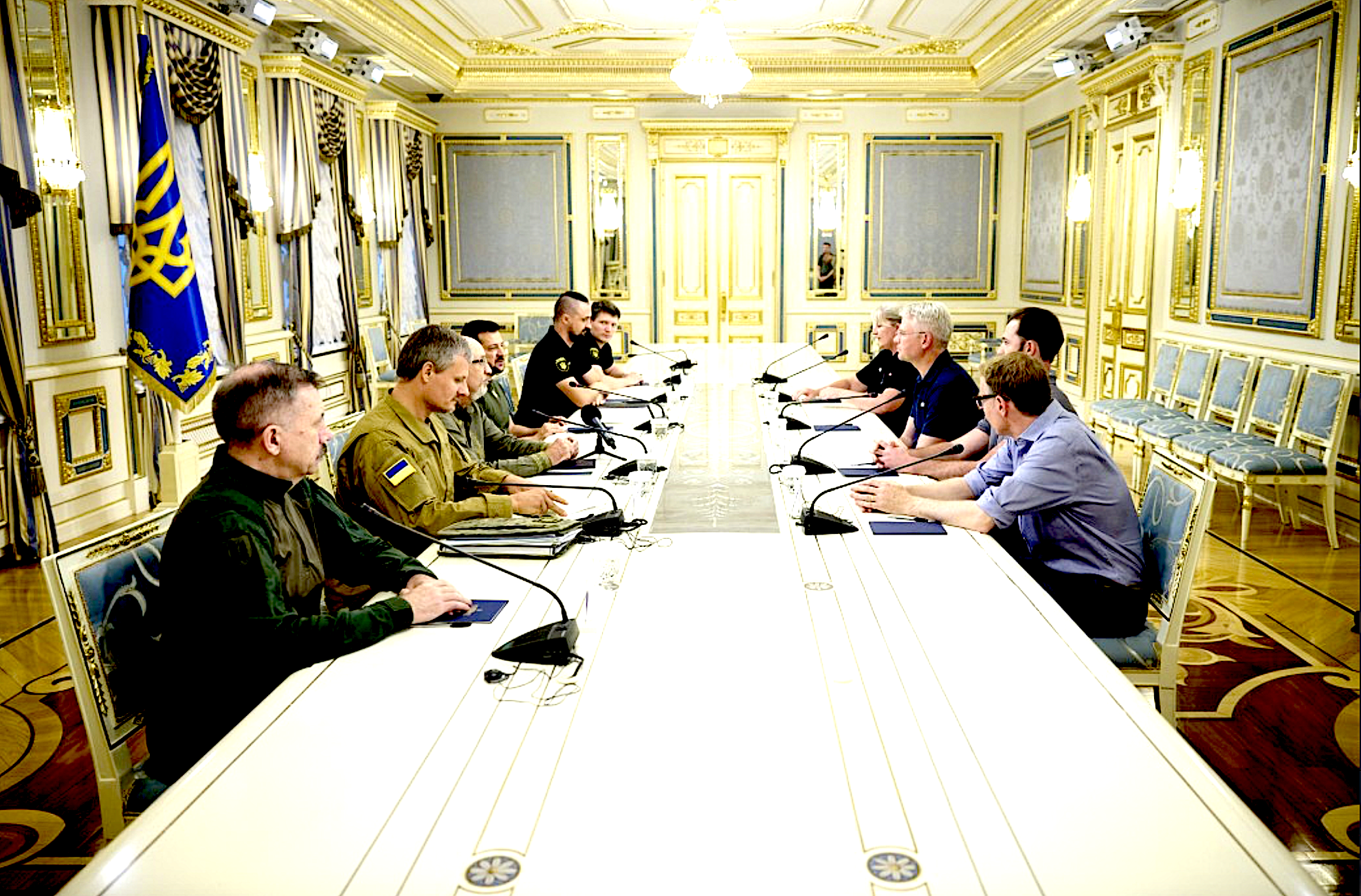
Zelensky meeting with BAE Systems CEO Charles Woodburn in 2023 in Kiev after the U.K. company decided to open an office in Ukraine. (The Presidential Office of Ukraine, CC BY-NC-ND 4.0)
A few months later, the U.K.’s MoD announced a contract for BAE to maintain and repair the L119 guns the U.K. military had gifted to Ukraine.
BAE is also opening a new artillery factory in the U.K. to produce howitzers for Ukraine, with production expected to begin this year. This effectively reverses the company’s earlier decision to scale down artillery production in the U.K.
In addition, BAE was given a £190 million contract in 2023 to produce 155mm artillery shells for the British army after the U.K. had gifted millions of rounds of ammunition to Ukraine.
This “will significantly increase BAE Systems’ production capacity, delivering an eight-fold increase and secure increased sovereign capacity for ammunition for years to come,” an MoD official said.
Similarly, Babcock established an office in Ukraine in October 2023 and announced in May 2024 it was setting up an in-country engineering facility to repair and overhaul Ukraine’s military vehicles. The company is also training Ukraine’s air force pilots.
100 Years of Arms Exports
The 100-year partnership agreement between London and Kyiv has in its Article 1 a focus on strengthening “military and defence industrial capabilities, including force development and collaboration between their defence industrial bases.”
Its declaration calls for “developing advanced weapons and ammunition manufacturing capabilities,” deepening “cooperation on long-range strike capabilities, integrated air and missile defence and complex weapons stockpiles.” There is also mention of “joint arms exports to foreign markets.”
Zelensky personally met senior U.K. military figures and representatives of BAE, Thales U.K., Babcock and other British arms firms on a visit to London in July 2024. The U.K. has conducted no less than five military trade missions to Kyiv since 2023.
The first of those missions, in December 2023, resulted in new agreements with Babcock, BAE and Thales. Mark Goldsack, the U.K.’s director of defence and security exports said: “With agreements already signed with our defence industry, the work will help boost resilience for both our industrial bases for years to come.”
Goldsack is not joking. The U.K. has created a new market for its military industry and is apparently seeking to exploit it for the next hundred years.
Mark Curtis is the director of Declassified UK, and the author of five books and many articles on U.K. foreign policy.
This article is from Declassified UK.
Views expressed in this article and may or may not reflect those of Consortium News.

Note: Jeff Sachs did mention Starmer by name.
Starmer is a classic example of a sociopath, may his reign be very short and his fall precipitous.
Hear hear. I believe the polls show his approval rating at an all-time low, not that he seems worried while he screws us and makes war abroad.
At the time of President Truman’s war scare in 1948, it was noted that elites like military spending for a number of reasons. One of which is because it stimulates the economy but does not produce anything that benefits ordinary people. There is, therefore, no redistribution of wealth.
One other aspect of this is that arms companies in the UK are significantly smaller than some other corporations but they enjoy much higher levels of access to government. This is referred to in a recent report by the Campaign Against the Arms Trade (CAAT).
That’s why neolib believers in trickle up econ finally allied with the empire desiring neocon fanatics. As exemplified by the Biden admin.
Trickle up has slowed markedly in this time of terminal capitalism because there isn’t much of a middle class anymore from whom to extract. Similar limits are showing up for entire ecosystems.
But there are wonderful opportunities remaining for investing in the MICIMATT system. And if growth is insufficient, simply use the IMATT part to foment demand for the MIC part.
Stupid is as stupid does.
This is what happens when those placed in a position to start wars just happen to also own shares in the industries of war.
It seems an obvious quid pro quo when one considers that UK democracy is but a word used absent of its meaning, thanks not only to the House of Lords.
Expect constant conflict, resource-theft and being told the boogeyman’s actions justify our retaliation, when those with the ability to start wars are allowed to personally get unimaginably rich simply by a more modern approach to privateering.
If you cared only for you and yours and knew you’d make £1,000 a minute playing the boardgame ‘Risk’ and that, even if you fail at your job and cripple your country while playing your game, you’ll still be offered positions in other powerful EU organisations until you die…wouldn’t you?
They once called us ‘Perfidious Albion’. It appears little has changed behind the scenes since then.
Any studies of the value of certain sections of the economy for the security and prosperity of the population have shown that militarisation and “defence” are the very worst. The products, besides their danger and destructive power, are not meant to last, and instead destroy people and infrastructure, lives and nature, while never lasting and helping development for the future. This applies especially of course , when “the enemy” is designated and demonised, the population is not asked if it agrees, private wealth is favoured to enrich the already rich, and the spending displaces needed social spending on health, housing, education, ie real security in life of real people. How sad that this is continued and expanded by a “Labour” government, led by someone who is a convinced Zionist who has hounded out of the formerly public-minded traditional Labour Party all members with any humanity and decency.
“$1 billion in military spending creates approximately 11,200 jobs, compared with 26,700 in education, 16,800 in clean energy and 17,200 in health care.” Costs of War, Watson Institute for International and Public Affairs, Brown University
Hannah Arendt said something like the genius of the rich is they persuade the poor to incarnate themselves.
He wants to use war, misery and death to finance the British economy which is failing because it operates as a wealth concentration pump from the public to society’s elite. The banality of evil. Not to mention stupidity. Even should the war approach not be completely immoral and disgraceful, which it is, it will not work because it does not address but simply contributes to the wealth concentration pump which is draining the wealth from the public. Just more of the same to make the rich richer and the not-rich poorer. I cannot even find the words to describe my utter disgust of Starmer and the British establishment. If Trump wanted to do something worthwhile, he would turn them into dog food.
LOL. it would probably make the dogs sick.
(and now he’s predicting Russia could reinvade the Ukraine without US security guarantees.)
(er, that’s another country which does not abide by the ceasefire agreements.)
The “defense” industry is an Orwellian term for the war industry.
Prime Minister Keir Starmer is and has been a fraud his whole public career. Just look at his track record. To make matters worse, he thinks he is pretty good at it and is getting better. Why should he change now?
The United Kingdom, the United States, and most of the world are given a choice of candidates who are bought and paid for. In a nutshell, the only leadership qualities these people have is to lead others down a primrose path. So for the modern day serf, according the Starmer types, it is either die at a desk, or die with a gun in your hand.
I thought I had the measure of the man shortly into his leadership of the Labour Party, but Starmer’s behaviour as Prime Minister has sunk well below even my low expectations. However, I have just read ‘The Starmer Project’ by Oliver Eagleton published in 2022, and all now makes sense.